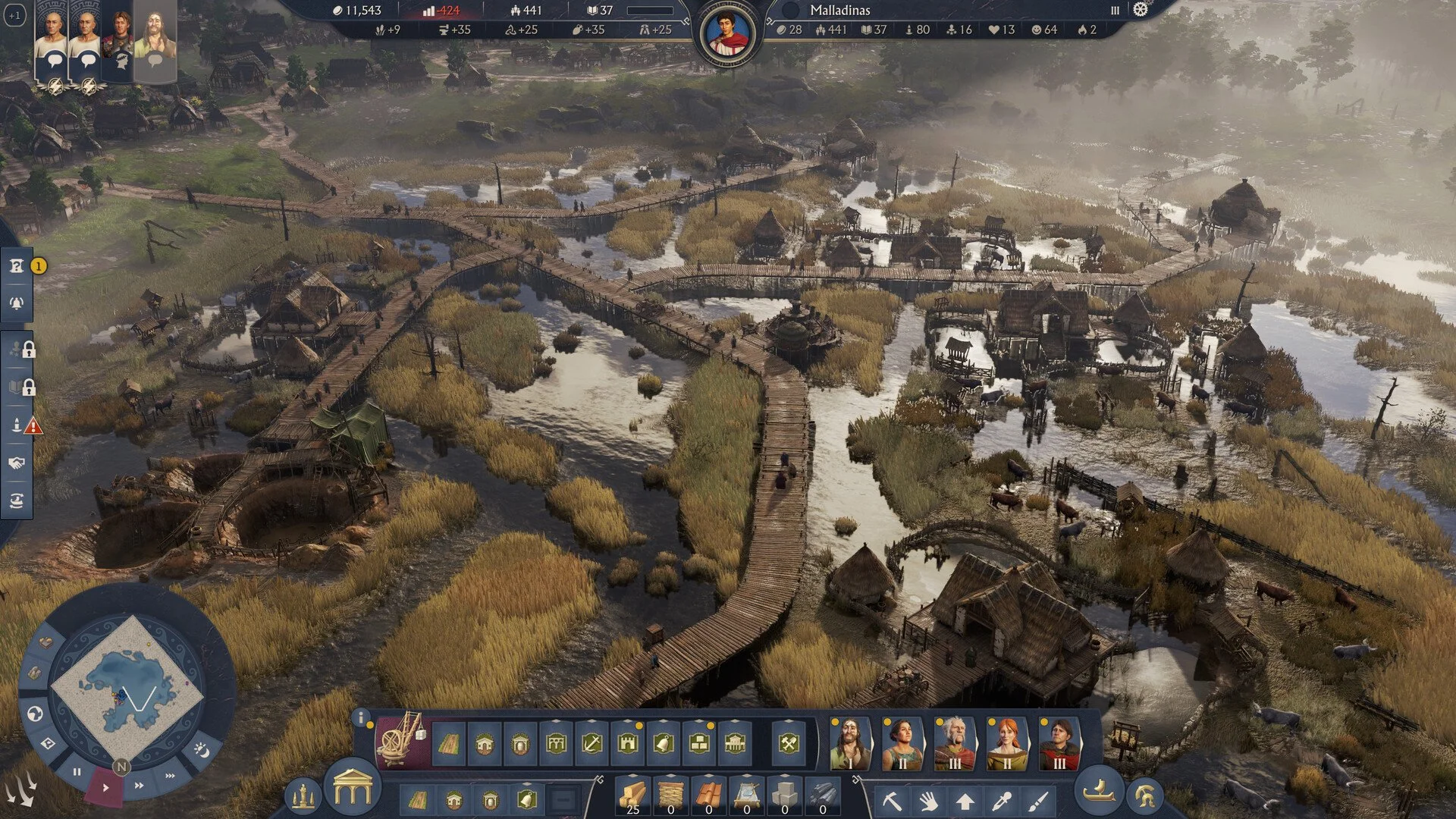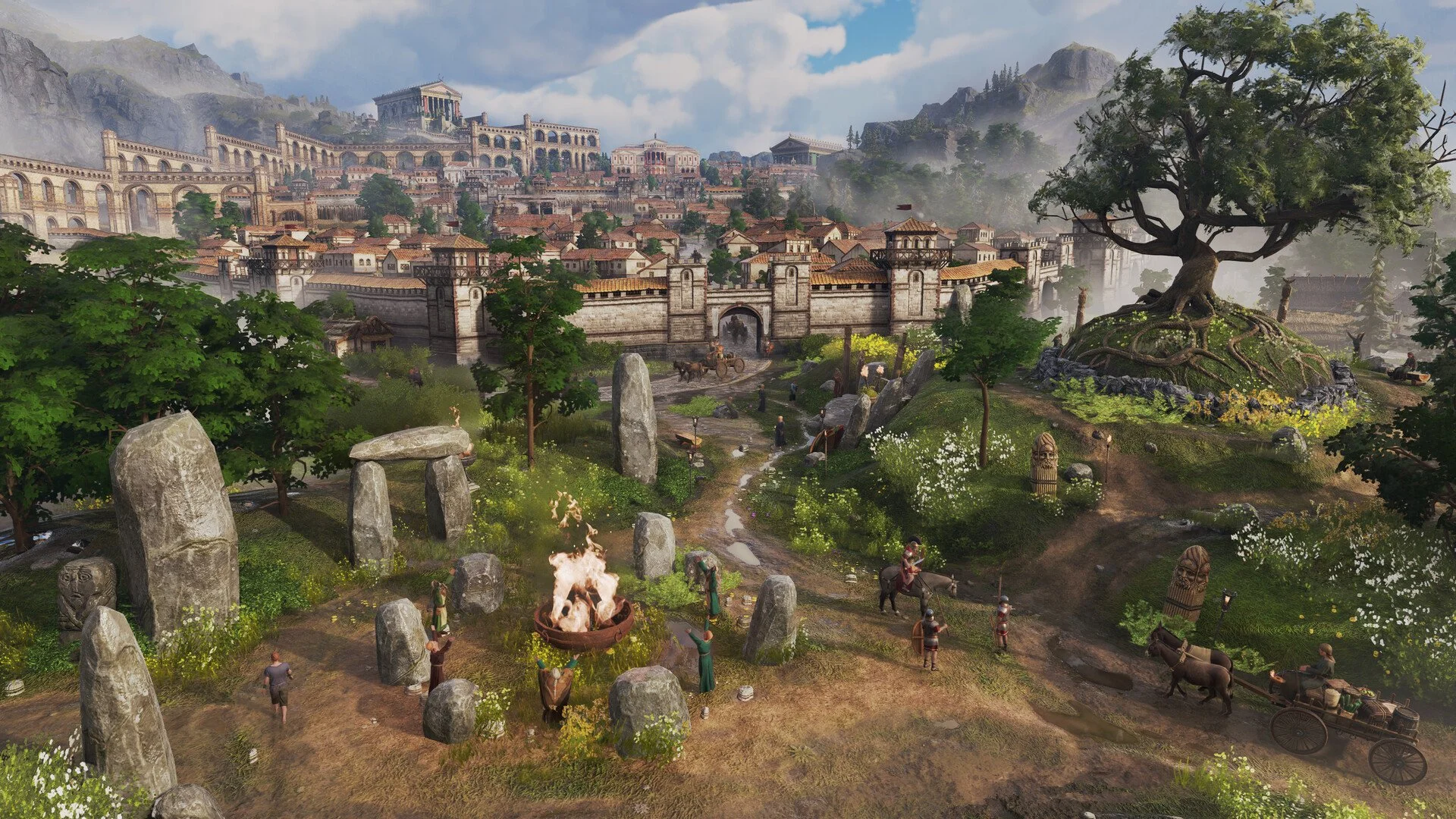Anno 117: Pax Romana - Review

The Anno series has been running for quite some time now, but in all that time the series has stayed to more recent histories and even a few future ones. Can the series take on the challenge of ancient Rome, or like the great library at Alexandria, are their ambitions about to go up in flames?
Anno 117: Pax Romana has a few modes, in the story mode you play as either Marcus or Marcia Naukratius, siblings who each have their reasons for doing the job they are given. When the story begins, your selected character is all but banished to the small region and given control, along with the simple objective, to make it work. The first few hours of your time in the game are more tutorial like, but eventually, you will be summoned to help the Empire out, including tracking down its wayward princess. Events take a turn though and you are banished to the land of Albion, where you are tasked with building up a new city for the Empire. The catch is that Albion already has a lot of folks that call it home, so you have to approach it in the right way, in order to not piss them off and that is where the challenge really begins.
Now the game does not have a single way to move forward, if you wanted to come in as a conqueror, then you can do that, but if you wanted to be more diplomatic, that is also an option. As you begin your quest to take control over the lands, both at home and in Albion, a lot of what happens is down to the people you meet and interact with. Some of these folks are easily distinguishable as either good or bad, but you can interact with them in a manner you want. If you want to trade with someone, you need a good relationship, so being nice is advised, but if you don’t care, then you can be uncaring to their plights. As you are dealing with the various groups and people, you also need to consider the people who live in your town, having them harvest crops, build ships and all those other city-based requirements and striking that balance can be a challenge.
That challenge mostly comes down to how little somethings are explained, which long time fans may not have an issue with. As you begin any city, either in the story mode or the sandbox mode, you will need to think long term about what you want, because if you build to fast, you might not have the coin to keep folks happy in the long term. The layout of the land can have quite the impact on your choices, if you have a lot of waterfront, fishing might be your base, but if you have little, then farming could be it. Even if you have plenty of one, the people may clamour for the other and that is where your need for balance comes into play. This is more like SimCity in that respect, sure you can plop down a few buildings and you will do fine, but having the right buildings in the right place, make a world of improvement. You can’t place homes around a pig farm and expect the people to love it, just like you would not want to live next to one in real life. Where you place things down is just as important as what you are placing down, and while all the parts will feel like they are needed, finding that balance is important. Perhaps more so when you deal with folks in Albion, who don’t want Roman aspects to take over their land.
All this is based around your little slice of land you have direct control over, but as you are a member of the Empire, expanding is almost a requirement. Across the world, both at home and in Albion, there are islands that you can take control of, each with pros and cons for doing so. One island might be a great source of a material that you need, but it may lack another to keep folks living there nice and happy. Which is where the trade comes into the mix, so those relationships you were building or ignoring can matter. In the story mode, the early trade relationships are given to you, but eventually you need to make your own and the same happens in sandbox. Building those relationships can be as simple as being nice to someone, but others will have requirements and some may not want to trade with you, if you have a different faith.
Faith can impact your game in a number of ways, but just know that you are not locked into a single one, if you want to change you can. However, the longer you stick with one, the more benefits you and your people receive, which can be great if an army comes to give you grief. This is one area where I feel the game lets itself down, because a lot of what you are focused on is city development and trade, so the military might, might not be a priority for you, until its needed. The game is fairly forgiving with armies that might come to visit, if your difficulty is set down, but even those can be a pain if you are not expecting them. Something that I was not a fan of when I did need to go to war, was the naval combat, which given Ubisoft have an entire game dedicated to naval warfare, feels wrong. It does the job, but it just feels overly complicated for what little you can actually do, as opposed to having your soldiers fighting on your city streets.
Something that I did like about those city streets, is that you can place buildings down almost freely, thanks to being able to use angles. I know some folks who live in the RTS space will compare to other games, like Manor Lords and for that it might not measure up, but it feels like a good expansion of the Anno experience. Across both the story and sandbox modes, learning how to balance city, trade, war and faith, all takes a fair bit of focus, but if you are willing to put in the efforts, the results can be quite satisfying.
Another part of the game that I found to be quite nice was the presentation, which at times feels like a documentary, just filmed with that tilt-shift style of film. When you are zoomed out, the world looks alive, people are going about their days, carts are taking supplies to warehouses, ships are casting off, it looks busy. Zoom out to far and it feels a little like a map, but when you zoom all the way in, you can see the details on the buildings and usage of the roads. This is great for seeing details, like the variety in homes and markets, but it is easy to get lost within those details, especially if a lot is going on. When you sail the world and discover new islands, getting a chance to enjoy them before you start to build is nice, again thanks to the detail in all the foliage that is present. The game is not perfect visually, a few textures like to flicker and occasionally some folks will walk through each other, more noticeable if you are zoomed in, but beyond that it looks great.
The game also sounds great, thanks to some solid voice work and more importantly a musical score that gets out of your way. The voice work is great, your character and those advisors, trading partners and key townsfolks, all feel authentic. Do they speak in old tongues, no but they don’t feel like it is a bunch of actors just reading lines. The games music takes what I call the Breath of the Wild approach, it only kicks in when the action needs it, so if you are just watching your city for a moment, the music is extremely low key in the background.
Anno 117: Pax Romana is a solid game, it offers up a fun story mode, though the amount of fun will vary depending on the choices you make. Being able to choose to be a tyrant or a partner to the folks of Albion is interesting and will give you reasons to replay. Sandbox is where the true freedom lies, but it also takes a lot of the training wheels away, so newcomers might feel overwhelmed at times. That is the biggest issue for me, there are times when things are explained in detail and other times the game just expects you to know, which for long time fans might be fine. If you are willing to put in the time then Anno 117: Pax Romana will reward you for your efforts, just remember you have to pay tribute to the Empire.
The Score
8.0
Review code provided by Ubisoft
The Pros
The economic focused gameplay, is a nice change from the more militaristic games of the genre
Being able to choose how the story mode plays out is quite fun and offers up reasons to replay
The Cons
The game does not explain somethings well enough, which might leave newcomers feeling unwelcome
The military aspects feel a little baked on, especially the naval combat, which given Ubisoft have a game all about naval warfare, feels weird










